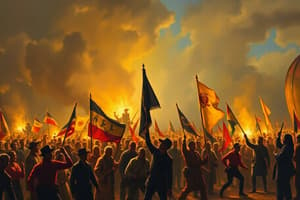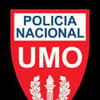Podcast
Questions and Answers
What event prompted the implementation of the War Measures Act in 1970?
What event prompted the implementation of the War Measures Act in 1970?
- The kidnapping of James Richard Cross and Pierre Laporte (correct)
- The election of the Liberals
- Civil unrest in Germany
- The fall of the Berlin Wall
The fall of the Berlin Wall led to the immediate end of the Cold War.
The fall of the Berlin Wall led to the immediate end of the Cold War.
False (B)
Name the radical Islamic terrorist group responsible for the 9/11 attacks.
Name the radical Islamic terrorist group responsible for the 9/11 attacks.
al-Qaeda
The Berlin Wall fell on November 9, ______.
The Berlin Wall fell on November 9, ______.
Match the following individuals with their respective roles or events:
Match the following individuals with their respective roles or events:
What was a consequence of the fall of the Berlin Wall?
What was a consequence of the fall of the Berlin Wall?
The FLQ was a group active in Germany during the 1970s.
The FLQ was a group active in Germany during the 1970s.
What was the approximate financial cost of the damage caused by 9/11 attacks?
What was the approximate financial cost of the damage caused by 9/11 attacks?
Which of the following was NOT a stated motive for the 9/11 attacks by Bin Laden?
Which of the following was NOT a stated motive for the 9/11 attacks by Bin Laden?
Canada's combat role in Afghanistan ended in 2014.
Canada's combat role in Afghanistan ended in 2014.
What was the name of the American response to 9/11?
What was the name of the American response to 9/11?
The United States and the Soviet Union came close to nuclear war during the ______ Missile Crisis.
The United States and the Soviet Union came close to nuclear war during the ______ Missile Crisis.
What was the primary target of United Airlines Flight 93 before it crashed in Pennsylvania?
What was the primary target of United Airlines Flight 93 before it crashed in Pennsylvania?
The term 'Cold War' was first used by Winston Churchill.
The term 'Cold War' was first used by Winston Churchill.
Match the following events with their descriptions:
Match the following events with their descriptions:
In what year did the Soviet Union dissolve?
In what year did the Soviet Union dissolve?
Flashcards
The October Crisis
The October Crisis
A period of heightened political tension and violence in Quebec, Canada, in 1970, marked by the kidnapping and murder of a prominent politician, Pierre Laporte, by the separatist group, the Front de Liberation du Quebec (FLQ).
Front de Liberation du Quebec (FLQ)
Front de Liberation du Quebec (FLQ)
A separatist group in Quebec, Canada, that sought to separate Quebec from the rest of Canada. Known for their use of violence and terrorism.
The War Measures Act
The War Measures Act
A Canadian law passed in 1914 and used in times of war or national emergency to grant the government extensive powers, including the ability to detain individuals without trial, impose censorship, and control the movement of people.
The Fall of the Berlin Wall
The Fall of the Berlin Wall
Signup and view all the flashcards
Communism
Communism
Signup and view all the flashcards
The Cold War
The Cold War
Signup and view all the flashcards
The 9/11 Attacks
The 9/11 Attacks
Signup and view all the flashcards
al-Qaeda
al-Qaeda
Signup and view all the flashcards
Cold War
Cold War
Signup and view all the flashcards
Cuban Missile Crisis
Cuban Missile Crisis
Signup and view all the flashcards
Space Race
Space Race
Signup and view all the flashcards
Fall of the Berlin Wall
Fall of the Berlin Wall
Signup and view all the flashcards
Dissolution of the Soviet Union
Dissolution of the Soviet Union
Signup and view all the flashcards
War on Terror
War on Terror
Signup and view all the flashcards
Invasion of Afghanistan
Invasion of Afghanistan
Signup and view all the flashcards
Canada's Role in the 'War on Terror'
Canada's Role in the 'War on Terror'
Signup and view all the flashcards
Study Notes
October Crisis (1970)
- FLQ Violence: The Front de Liberation du Quebec (FLQ) intensified bombing campaigns in Quebec after the 1970 election, escalating violence.
- Kidnappings: Four FLQ members kidnapped James Richard Cross, a British trade commissioner, demanding the release of political prisoners and a public reading of their manifesto. Five days later, they kidnapped the Quebec minister of labour, Pierre Laporte.
- War Measures Act: The War Measures Act, enacted on October 16, suspended civil rights and liberties, allowing police broad powers of search and arrest.
- Laporte's Death: The body of Pierre Laporte was found on October 17, 1970, after police received a tip.
Fall of the Berlin Wall (1989)
- Date: The wall fell on November 9, 1989, following an announcement by the East German government to open its borders.
- Contributing Factors:
- Political pressure from Eastern Europe due to protests in Poland and the Soviet war in Afghanistan.
- East German citizen discontent with communist leadership.
- Soviet leader Gorbachev's policies of openness and reform (perestroika and glasnost).
- Consequences:
- German reunification: Germany was reunited on October 3, 1990.
- End of the Cold War: officially declared at the Malta Summit in early December 1989.
- Shift in Soviet attitude: The Soviet Union recognised West Berlin's continued capitalist status.
- Propaganda victory for the West: The fall symbolized communism's weakness in controlling its population.
The War on Terror (2001)
- Attacks: Four coordinated attacks occurred in New York, Virginia, and Pennsylvania.
- Responsibility: Radical Islamic terrorist group al-Qaeda claimed responsibility, led by Osama bin Laden.
- Casualties/Damage: Almost 3,000 people died, with $10 billion in damage to property and infrastructure.
- Targets:
- American Airlines Flight 11 and United Airlines Flight 175 hit the World Trade Center towers.
- American Airlines Flight 77 crashed into the Pentagon.
- United Airlines Flight 93 crashed near Shanksville, Pennsylvania, after passengers fought back.
Military Action in Afghanistan (Post-9/11)
- American Response: Following 9/11, President George W. Bush initiated the War on Terror focusing on Afghanistan.
- Taliban Connection: U.S. targeted the Taliban government of Afghanistan for harbouring al-Qaeda.
- Canadian Involvement: Canada joined the international anti-terrorism mission in Afghanistan in 2001.
- Extended role in 2006 focus shift to troop training 2011.
- Complete withdrawal of Canadian troops- March 2014.
The Cold War (1947-1991)
- Defining Feature: A period of tension between the US and Soviet Union (and their allies).
- Defining figure: Initiated by George Orwell in 1945.
- Key Events:
- Cuban Missile Crisis (1962): The US and USSR came close to nuclear war over missile sites in Cuba.
- Space Race: A competition in space technology due to nuclear arms competition.
- Fall of the Berlin Wall (1989): Symbol of the Soviet Union's decline.
- Dissolution of the Soviet Union (1991): The Soviet Union was broken up into independent states.
- Canadian involvement: Canada played an active part, participating in the Korean War.
Studying That Suits You
Use AI to generate personalized quizzes and flashcards to suit your learning preferences.





